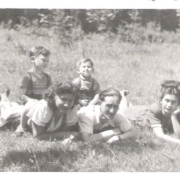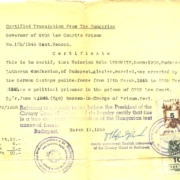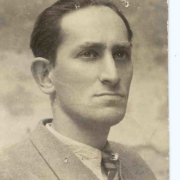Stolz Family
Gestapo
Henry 1945
Linking Pesach and liberation from the Shoah
by: Peter Dan
In December 1995, with my wife and my children, we visited Israel for the first time. At Yad Vashem, we went to look for a name amongst the list of righteous gentiles. We were looking for the name of Karl Stolz, the man who allowed my father and 3 of his companions to hide out on his estate and was shot by the Germans for that crime. We did not see his name on the list, so my wife urged me to see if his name could be added. Our guide was able to get us an interview without an appointment right there and then, but when I told them the story their reply was that the name can only be added by a survivor, not by the survivors’ family. We were ready to leave dejected when a lady came in from the hallway to say she heard us talking about Karl Stolz. She said that he was added to the list just three weeks before and a ceremony was held in Budapest for his family. They did not have time yet to add his name to the list.
We were ushered into the office of the director and I was asked to repeat the story. As soon as I mentioned the name of the estate where my Father and his companions were hiding out, he stopped me. He produced a set of file of documents six inches thick, and said, here is your story. Karl Stolz was added to the list upon the testimony of the last survivor of my Father’s group of four, Benjamin Abeles. He gave me his contact information and a few years later, my Brother and I met this man in Tel Aviv. He gave us a long story of which I will only repeat here the part where two stories some 3000 years apart link together; Liberation from Egypt and Liberation from the Holocaust.
The following are the words of Benjamin Abeles.
“…We went to see this man, his name was Karl Stolz. He gave us food and allowed us to stay in his stables. Apparently, he allowed deserters from the army to stay there for a few days on their way back to their homes. One day, while chopping wood, I cut my leg. The man’s wife bandaged my leg and while doing so, she asked me when was the last time I heard from my parents. I told her “not for a long time.” She asked me what did I know of them. I could see that she was suspicious, so I told her the truth; that we were Jews. She said she suspected it right away. She told me she was very sorry to see what was happening to us Jews, but she said that as we were Jews, we could no longer stay there in the stables. She said we had to move to the basement of their home and hide out there.
One day the provincial police came and surrounded the property. Karl went out to speak to them and in the meantime, his wife told us where to hide. We jumped out the window and ran up into the mountain. The snow was up to our knees, but fortunately, it was very windy and the wind quickly erased our tracks. A few days later we snuck back and were told that the danger had passed. They suggested however that it would be better if we stayed up on the mountain to avoid someone suspicious reporting us.
We dug a bunker four meters deep with a side passage on each side just high enough to crawl in. We slept there during day two on each side. We put a ladder down and each night we went out to relieve ourselves. Every other night we visited the Stolzes, got food and listened to the radio. We became very good friends. We covered up the entrance to our bunker with a board on which we piled some earth and snow.
It was on March the 15th as spring was on its way, that we heard our lookout yell; “We are lost! They found us. We heard soldiers running and we heard shots being fired. They ordered us to come out, one at a time,
They lead us through the village yelling Jewish Guerrillas. One of us (Henry) spoke German perfectly and he had an answer for everything. Quickly following his lead, we figured out what we had to say. Finally, the Commander came in and asked, “What’s the point in talking to these Jews. Take them outside and shoot them.” Then came an air raid and we were taken back to our cells. One of my companions, Leslie Zsigmond, was a Communist organizer and had been in Palestine before the war. That calm and serious man turned to me and asked me if we had a chance to escape. I said we did. What percentage-he asked. I said fifty-fifty.
Suddenly that calm and serious man was on top of me, yelling at me. You stupid Orthodox! Only an Orthodox can be this stupid! Didn’t you hear that we were sentenced to death? How could we escape now! I said I didn’t know how, but I believed in the goodness of God. That I believed He will rescue us.
We were taken to Gestapo Headquarters in the Hungarian city of Gyor, near the Austrian and Slovakian border.
One day we heard the artillery. The Russians were shelling Gyor. They released all the common criminals. At first only the accused, then all those who had been sentenced; all the thieves, robbers and murderers. The only ones left were us Jews.
Early in the morning, the Hungarian Nazis came to get us. The Russians were coming and everyone was fleeing. We were the last ones to cross the Danube. After us they blew up the bridge. The soldiers were all lying by the roadside ready to surrender.
We were turned over to SS officers, who came and started beating us. I was the youngest. I tried to stand on my feet as long as I could, and die bravely. In the end I collapsed on the ground. Blood was pouring from my head, they knocked out my teeth. I recited my last confession (Al heit she hatanu) As I lay there bleeding on the ground, a thought came to me.
“If I tell this at home, they won’t believe me.”
How naïve I was! There was no more home, there was no one to tell it to. My parents and my brothers had already been killed. Torture and killing were everywhere. The SS decided they will not execute anyone without an order from their commanding officer.
They woke up the Commander and he came to see us. He ordered them to turn us back to the Hungarian authorities. They locked us up in an abandoned laundry for the night.
The next morning, we woke up to silence. The door opened, and there were no guards. Saw soldiers in the back yard of houses changing their uniforms to civilian clothes. The Russians have arrived, we were liberated. It was the first day of Passover.”
I checked out the story. I have attached here an official certificate translated from Hungarian Authorities testifying that my father, Heinrich Lebovits, was held as a ”political prisoner” at Gestapo headquarters in Gyor from March 17 to March 27, 1945. It seems they were captured as he said, on March 15, interrogated on the 16th, and taken to Gyor on the 17th. On the 27th they were taken from Gyor across the Danube and locked up in the abandoned laundry on the night of the 28th.
Did Benjamin Abeles embellish the story?
This year’s first day of Pesach was April 16th. I looked up the first day of Pesach 1945. It was indeed on March 29, 1945.
As a codicil to the story, thanks to Yad Vashem, we were able to re-establish contact with the Stolz family.
My wife and I visited the daughter Eta Stolz. She took us on a tour of the city of Szekesfehervar, one of the largest cities in Hungary outside of Budapest. She showed us all the places where Jewish-owned businesses used to stand in the city. She showed us the Catholic High School. She said, “this is where I went to school before the war. More than half of my classmates were Jewish.” She pointed out a place on the street where the Great Synagogue of the city used to be. She said, we went to weddings and Bar-Mitzvahs there before the war.
“That is why my father could not turn away your father and his companions. The loss of our father was a great tragedy for us, but we were never sorry for what we did. We were devout Catholics, and we did what we thought God wanted us to do.”





